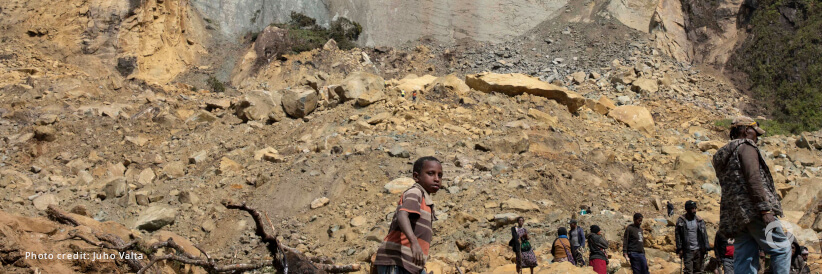Humanitarian assistance in Enga Province Papua New Guinea, following the major landslide of 24 May, has been hampered by a lack of road access, increasing tribal tension, and a 72-hour evacuation order issued by the local government, according to the international humanitarian organization, CARE.
CARE is currently in the affected areas of Yambali Ward where the landslide occurred. It is conducting a Rapid Gender Assessment to understand the specific needs of women and girls affected by the disaster. In addition, CARE is preparing to deliver water, sanitation, and hygiene support and dedicated safe spaces for children left traumatized by the landslide and its aftermath.
As CARE Program Director for Mainland Programs in PNG, Doreen Fernando says: “We’ve been speaking with women affected by the landslide this week. Whilst they were able to escape from the landslide, they now have no spare clothes or food, and it’s beginning to get very cold in the Highlands. Monsoon season, bringing rain with it, is also about to begin. In addition, many mothers have been telling us their children are beginning to fall sick. There’s also been a diarrhoea outbreak due to lack of sanitation and hygiene options.”
The evacuation order is displacing people onto neighboring lands which is fuelling pre-existing tribal tensions in the region.
“We have a situation where people have been told that it isn’t safe to stay where they are and that the landslide could continue down the mountain. But they don’t have anywhere to move to,” says Fernando.
Fernando says that the poor road conditions have meant that some surrounding villages have also been cut off, so these people are also in need of assistance.
“The land in Yambali Ward is still unstable, which means that we can’t set up a base on site, and instead our aid trucks have to travel a 5-hour round trip every day, through poor road conditions, from our base in the Enga Capital, Wabag.b Despite the challenges there is a steady supply of food from aid agencies, however the demand is growing as more people require aid, and it is proving difficult to better understand just how many people are in need.”
There is still no official figure for the number of deaths from the landslide, or the number of those affected, though estimates are that around 4000 people lived in the area where the landslide occurred.
CARE will continue to deliver humanitarian assistance where it is needed, as Fernando notes: “The situation is ever-changing and there will continue to be difficulties with setting up aid tents in the area, but we will go to wherever people, particularly women and girls, need our support.”

